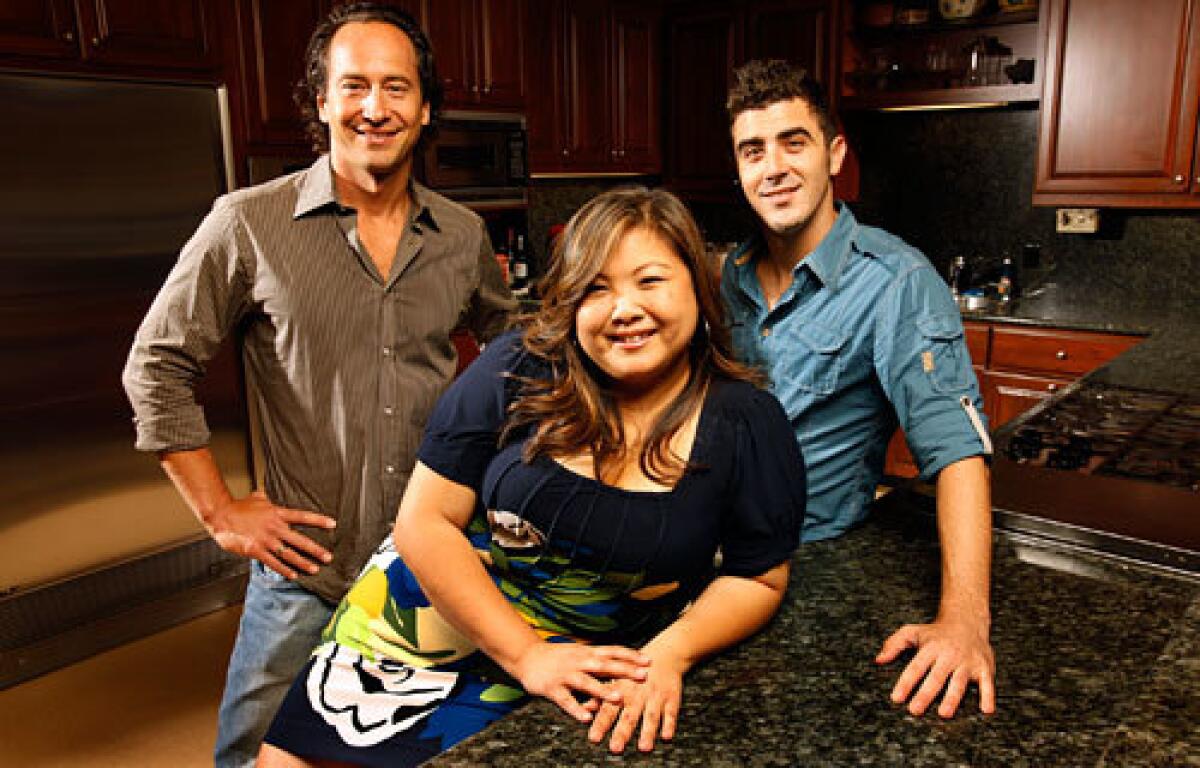Stakes are high on ‘The Next Food Network Star’

- Share via
The winner of “Top Chef” gets a kiss from Padma and $100,000 to open a new restaurant. The chef who can withstand the heat in “Hell’s Kitchen” gets a $250,000-a-year job as executive chef under the tutelage of chef Gordon Ramsay.
On “The Next Food Network Star,” the prize is without parallel: The winner gets his or her very own TV show, a golden ticket to a seemingly endless buffet of opportunity.
It might as well be called the search for “The Next Food Network Brand” because if the Food Network has its way, the show will be just the beginning: a weekly platform from which to launch cookbooks, pots and pans, housewares and, who knows, perhaps even dog food, all reinforcing the Food Network brand.
“A whole career is at stake,” says Food Network star Bobby Flay. “It’s like Disney World. There are so many things now that revolve around food.”
That’s a lesson the Food Network learned after watching arguably its biggest star -- the perennially perky Rachael Ray -- go on to craft deals for spinoffs including her phenomenally successful line of 30- minute-meal cookbooks, linens, knives and, yes, even canine kibble.
All of those deals add up to a reported $18 million a year for Ray, but the Food Network gets not a dime. (For the record, proceeds from Ray’s Nutrish dog food line go to her Rachael’s Rescue charity.)
It’s hard to imagine such a thing happening today, given the game-changing rise of “360 deals” in the entertainment world. They became a mainstay in the recording industry -- perhaps most notably after concert promoter Live Nation struck deals with Madonna and Jay-Z giving them millions upfront in exchange for far-reaching rights -- and have drifted elsewhere.
These days, Food Network is making sure it gets a piece of the action.
The network will not discuss contractual details. But winners of the reality competition, now entering its fifth season, as well as the also-rans, will find themselves partnered with the network should they find a way to leverage their role on “The Next Food Network Star.”
“We are much more proactive and calculated about how we use our assets, particularly our talent,” says Susie Fogelson, vice president of marketing and brand strategy for the network. As for the winner of the competition, “We’re partners in everything.”
And that’s just fine with Eddie Gilbert, 30, one of three Los Angeles competitors who will be on the show, which begins Sunday.
In fact, he’s gambling on the very same outcome.
“This will help me figure out ways to brand myself,” says Gilbert, who adds that a partnership with the Food Network will help him open doors that might otherwise be shut to someone who switched careers to cooking just a few years ago and is essentially self-taught.
Gilbert, who rocks a faux-hawk and specializes in easy, guy-friendly cooking, is launching a catering business aimed at soon-to-be-newlyweds who want to enjoy one last night of “freedom” with a party that revolves around sophisticated, multicourse tasting menus. His website is called Foods4Dudes (but he stresses that bachelorettes as well as bachelors are welcome).
The two other local contestants are: Jeffrey Saad, 42, who owns a Bel-Air real estate brokerage business but has a background in food, including launching several restaurants; and Debbie Lee, 39, a restaurant consultant who is preparing to open her own “concept” restaurant in L.A.
Charisma quotient
“The Next Food Network Star” is like one long job interview. And knife skills aren’t the only qualification.
Bob Tuschman, the network’s senior vice president of programming and production, says the network is looking for that intangible something that might best be described as star quality.
“You can be the best cook in the world but also be a person that no one wants to see again,” Tuschman says. “You have to have a personality where people would want to invite you back into their homes, their living rooms, week after week.”
It’s this twist that viewers find so compelling, says Jacob Strauss, whose blog, FoodNetworkAddict, is must-reading for network fans. (It’s also why he says that the prize is arguably better than winning “ American Idol.”)
“When the show ends and the winner gets crowned, it’s not over, it’s just the beginning,” Strauss says. “With ‘American Idol,’ the winner goes away and then you don’t hear from them until they have a CD. Here, the contestants come back and you get to watch them week after week. The audience really has a vested interest.”
That vested interest has helped make the series the network’s top-ranked show, by far, averaging 2.7 million viewers per first-run episode for Season 4. By comparison, Bravo’s “Top Chef” averaged 2.9 million viewers for its first-run episodes last season and Fox’s “Hell’s Kitchen,” the only cooking competition on a major network, averaged 8 million.
A grueling trial
Then there’s the sympathy factor.
It’s not hyperbole to call “The Next Food Network Star” a punishing competition. Contestants are thrust into a series of challenges that mimic life on the Food Network set -- cameras watching every move. Flay says he has wondered whether he would have been able to make it through such a competition when he was starting his cooking career.
When the show was announced, Tuschman says the network had well over 10,000 applicants because so many people watch the Food Network and say, “I can do that.”
After the first season’s “peek behind the curtain of the star-making process,” as Tuschman puts it, applications plummeted. Now they get about 2,000 submissions.
Winning “The Next Food Network Star” does not guarantee success -- those branding opportunities are just that: opportunities.
Now in its fifth season, the show has launched only one bona fide breakout: Guy Fieri, the host of “Diners, Drive-ins and Dives” as well as other Food Network shows, author of cookbooks and a pitchman for TGI Friday’s.
But there’s little downside for the network, says Derek Baine, an analyst for SNL Kagan, who says this star-making machine only helps the highly profitable Food Network.
“A lot of people would love the chance to get on TV and make a name for themselves and are willing to take little upfront to have a chance at some really high upside on the back end,” Baine says.
As for Ray -- is she one who got away?
Not really, the network says. She’ll be forever associated in the public’s mind with the Food Network, which launched her career. And that’s the kind of PR the network couldn’t begin to buy.
Fogelson says she looks at Ray’s success and thinks, “ ‘Way to go.’ . . . I learned a lot from what Rachael does and those business deals.”
She added, “I don’t look backward, I look forward.”
More to Read
Eat your way across L.A.
Get our weekly Tasting Notes newsletter for reviews, news and more.
You may occasionally receive promotional content from the Los Angeles Times.











